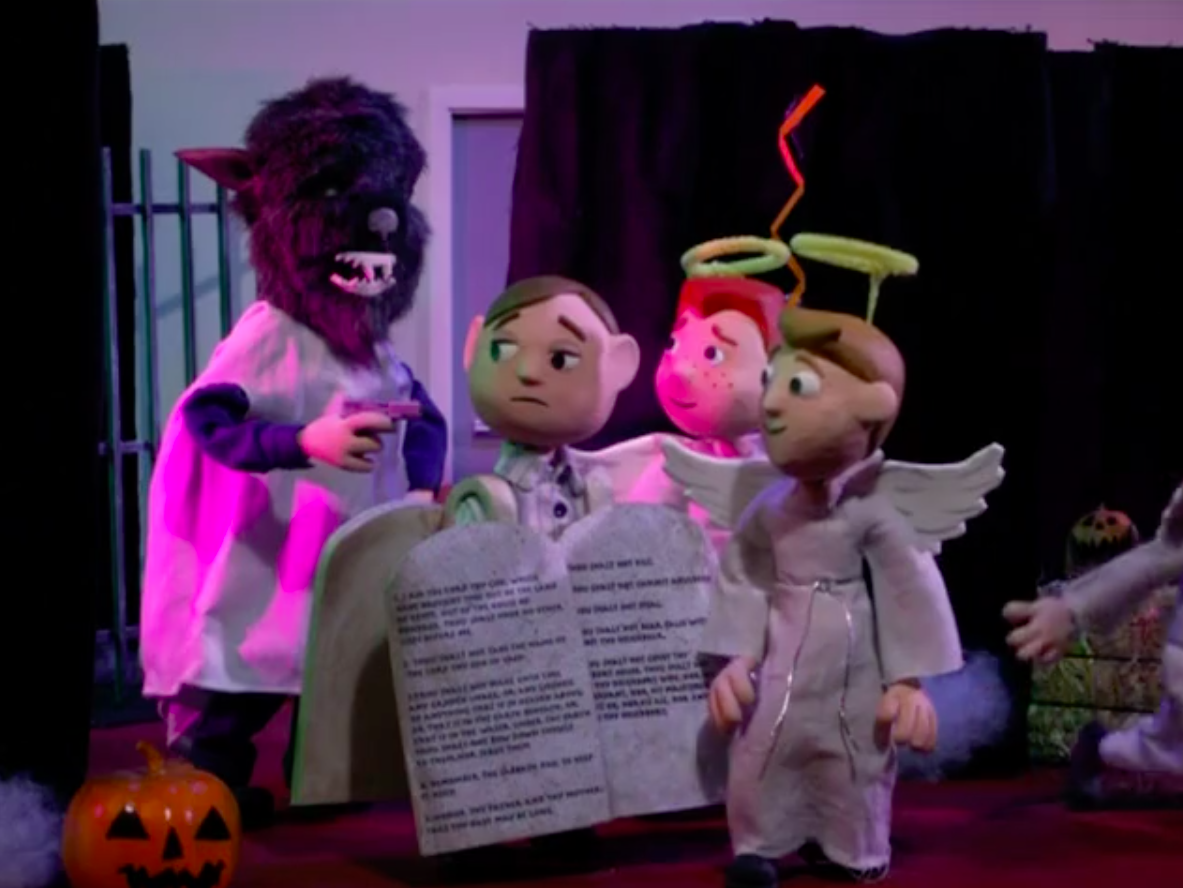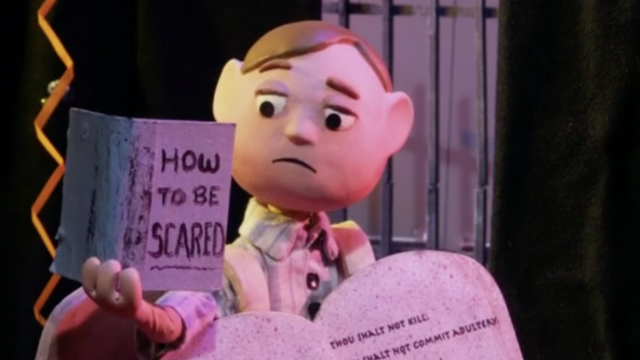In the very first episode of Dino Stamatopoulos’ Moral Orel, 11-year-old Orel Puppington resolves to bring the dead back to life by reading from the Necronomicon because of his sincere and naive belief that the deceased are “rejecting” Orel’s God’s greatest gift: life. Terrifying as it is when zombies start rising from their graves and eating people, Orel can’t help but be elated.
By the end of “The Lord’s Greatest Gift,” Orel manages to plunge his entire town into a contained apocalyptic hellscape that’s almost like something out of the Bible. In the episode’s final moments, Orel’s father sternly explains to him that what the townspeople of Moralton are afraid of isn’t that the zombies feast on human flesh, but that many of the zombies are naked, a clear violation of the “lost” 11th Commandment: “Thou shalt be ashamed of thy natural anatomy.”
Over the course of its three seasons on Adult Swim, Moral Orel frequently centered ideas about fear within stories lambasting the ways in which clinging to scriptural interpretations of the Old Testament can lead to having a warped sense of reality. Like all of Moralton’s citizens, Orel’s relationship with God is a core part of his identity, but his guilelessness often makes it difficult if not impossible for him to perceive how he’s essentially the only person in town really making any sort of effort at trying to be a “good” person.
More often than not, Orel’s general naivete about the inner workings of people’s minds made it so that he was able to unquestioningly put his faith into others, never taking into consideration the possibility that they might not have his best interest at heart. Between being relatively sheltered and raised to have an unerring faith in the idea that God’s always protecting him, Oreal develops a sort of stunted sense of fear (a lacking, really) that actually ends up serving him well as he gets into all sorts of well-meant mischief.
It isn’t until the Halloween featured in “God-Fearing” that Orel comes to the realisation that he doesn’t exactly have a healthy sense of fear, a fact that distresses him and puts him on a journey of the soul to figure out just how to freak himself out. While the rest of Moralton busies itself with getting into the holiday spirit by dressing up as monsters and ignoring the very real personal demons they’re all haunted by, Orel’s consumed by a growing concern that his belief in Jesus is inadvertently robbing him of the fun aspects being afraid of things

“God-Fearing” takes a turn after Orel interprets a sermon at church a bit too literally and reasons that, by breaking the 10 Commandments (but curiously, the 11th goes unmentioned), he can free himself of God’s love and protection, making it possibly for him to be spooked by all Halloween has to offer. The boy’s logic is twisted beyond belief, and as he proceeds to break each of the Commandments, he gets farther and farther away from who he really is (read: an odd child who means well) and closer to being a proper monster who steals from others and is delighted to take credit for accidentally killing a person.
Orel’s unintended path to becoming a chaos agent is gently nudged along by basically every adult in his life, ranging from his parents, to his reverend, to the weird cop who has a thing for brandishing his gun at children, and it’s in those characters that “God-Fearing” puts what’s really scary about society front and centre. The monsters Orel should be wary of don’t have fangs and can’t walk through walls; they’re the regular, everyday people he interacts with on a regular basis who, deep down, don’t exactly have his best interests at heart.
This sort of existentially grim energy was an essential element of Moral Orel’s humour, and it ultimately made the character’s turn toward a sobering maturity later in the series so satisfying. Scary as it is to contemplate living in a world full of people who’re solely concerned with their own well being and desires, that can very much be the case in some instances. The way way to guard against it, really, is to be mindful and try not to be that way.
[referenced id=”1237143″ url=”https://gizmodo.com.au/2020/08/zombie-stories-are-going-to-have-to-change/” thumb=”https://gizmodo.com.au/wp-content/uploads/2020/08/05/xv1eglaegrfy6grimq5p-300×169.jpg” title=”Zombie Stories Are Going to Have to Change” excerpt=”At the core of every movie involving a zombie apocalypse is an idea about humanity’s drive to consume, or how easy it would be for civilisations to crumble in the midst of an unforeseen disaster. Like, for instance, the sudden spread of a deadly virus that swept its way across…”]
